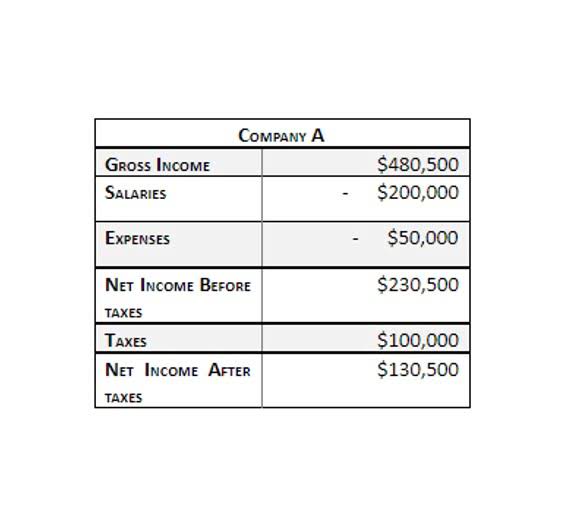
As discussed earlier, several Code sections require a tax preparer to retain the records for at least three years. This mirrors the standard statute of limitation Legal E-Billing for a taxpayer in Sec. 6501(a), which runs for three years after the filing date or the return due date (including extensions), whichever is later. However, in several circumstances, a longer statute of limitation may apply to a taxpayer.
- You must keep the records on the old property, as well as on the new property, until the period of limitations expires for the year in which you dispose of the new property.
- Your good recordkeeping also helps you determine which valuable credits and deductions you qualify for and provides documentation if we ask you for additional information.
- In most cases, the IRS recommends keeping tax documents for at least three years after filing your return and/or paying taxes.
- The following TurboTax Online offers may be available for tax year 2024.
- This is consistent with the rule of thumb that documents should be kept through the end of the longest applicable statute of limitations period, which is 6 years for breach of contract and fraud claims in both NY and NJ.
- If that’s the case, you might be able to write off your worthless securities or bad debts.
Shop All American Express Credit Cards

The most common examples are records relating to real property, such as proof of the purchase and sale price, capital improvements, amounts taken for depreciation, etc. You also need documentation of other investments like stocks and bonds that show how much you paid and what you received upon sale. Such records should be kept for the length of the statute of limitations period after they were sold. This is so you can calculate your gain or loss on the sale for tax purposes.
What Affects the Statute of Limitations?
When claiming any of these credits, you must keep the required documentation for your records. You must be able to compare records from one time period (such as month, quarter, or year) with records from another period. Upon request, you must make your records available to the Tax Department. Most records can be kept as paper, but it is a good idea to convert them to electronic files and have a backup copy saved in the cloud or on a separate hard drive stored in a secure location. This is so you have these documents in case your computer or home is damaged.

Recordkeeping for individuals
Free filing of simple Form 1040 returns only (no schedules except for Earned Income Tax Credit, Child Tax Credit and student loan interest). This column focuses on discussing these questions relative to work product and documentation records. All users of our online services are subject to our Privacy Statement and agree to be bound by the Terms of Service. Writing off tax deductible items for small business can reduce taxes.

N.Y. Comp. Codes R. & Regs. Tit. 20 § 158.8 – Retention of records

The time limit for a state tax audit may also be longer if you don’t report all your income or include false information on your return. Based on these two limitation periods, the IRS generally recommends keeping tax returns and any supporting documentation for at least three years after filing your return and/or paying your taxes. That way, if the IRS comes calling or you later discover a tax break that you missed, you’ll still have all the tax records you need.
- Your books must show your gross income, as well as your deductions and credits.
- Or, get unlimited help and advice from tax experts while you do your taxes with TurboTax Live Assisted.
- While keeping an actual copy of the tax return or claim for refund prepared might not be required, it may be prudent to do so, as discussed in a following section of this column.
- Several state tax authorities share statutes of limitations similar to that of the IRS but with differences in the details.
- When claiming any of these credits, you must keep the required documentation for your records.
- But if you sell the house before then or if your gains are larger, you will need to have your home purchase records.
- For freelancers, the most effective way to save on taxes is by taking advantage of tax credits and the many tax deductions they qualify for.
- At the beginning of each tax year and before you claim a credit or itemized deduction, review these checklists to be sure you’re keeping the records you need to get the credits and deductions you deserve.
- Rocky holds a law degree from the University of Connecticut and a B.A.
- Act now and file your IRS tax returns with FlyFin before the last day to file taxes in 2024.
Taxpayers who have misplaced a adjusting entries copy of a prior year’s return can order a tax transcript from the IRS. This transcript summarizes the return information and includes AGI. This service is free and is available for the most current tax year once the IRS has processed the return. These transcripts are also available for the past 6 years’ returns. When ordering a transcript, always plan ahead, as online and phone orders typically take 5 to 10 days to fulfill. Mail orders of transcripts can take 30 days (75 days for full tax returns).
For example, if the state is challenging your residency for income tax purposes, it new york income tax may ask for cellphone and E-Z Pass records, appointment calendars, credit card statements and other information. A New York tax lawyer can provide guidance on how to respond to document requests. Direct File is part of Governor Hochul’s ongoing effort to save New Yorkers money and improve government services. As part of her FY 2026 Budget, Governor Hochul proposed a middle class tax cut to deliver nearly $1 billion in tax relief to more than 8.3 million New Yorkers. When fully phased in, the middle class tax cut will deliver hundreds of dollars in average savings to nearly 77 percent of filers — representing three out of every four taxpayers.